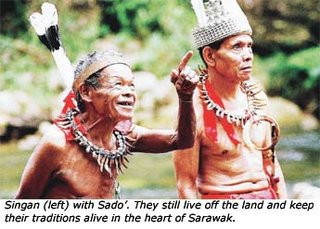 Photo Courtesy of and Copyright to New Straits Times
Photo Courtesy of and Copyright to New Straits TimesBy Firdaus Abdullah
IN the days of old they were the feared headhunters who roamed the interior of Borneo, striking terror in the hearts of their enemies. They are the Tringgus, the hunter-gatherers of Borneo when there were no borders.
They were the people of the land who knew the medicinal plants and poison sap, the edible plants and roots. In short, they knew the jungle.
Today Singan Ngegek and Sado’ Sanyek are the only members of their Tringgus tribe to maintain the old ways, traditions and animist beliefs (headhunting has long since been given up).
The rest of the tribe has embraced Christianity and, to a great extent, modern culture. But these two members of a feared tribe with a headhunting past refuse to budge.
Singan cannot remember how old he is or which part of the Bengoh Range he was born, but the cheerful custodian of the ancient tribe’s traditions is easily 90.
Singan and his trusted companion, Sado’, 64, are among the last of the "original" Tringgus people.
They lived deep in the interior of Borneo and had their settlements on both sides of the Bengoh Range until politics separated them.
Those who remained on the Sarawak side became Malaysians and continued their way of life until the late 1970s, when the Government advised them to move away from the border because of security threats from communist terrorists.
"Tringgus Lama is about three hours (by foot) from here. That was my home but we had to move," Singan said.
"Maybe our old shacks are still there. I haven’t been there in a long time."
The Tringgus tribesmen of his clan lived a life of poverty, often hunting and at times planting hill padi.
"We used to cover ourselves with tree bark and the bigger leaves.
"Only later did we start wearing loincloth.
"Food was the greens in the jungle and whatever animal we could hunt with our blowpipes and spears. We used to fish in the rivers.
"Now things have changed a great deal, but I will continue to safeguard the Tringgus tradition, culture and way of life as long as I’m alive ... this is my duty to my ancestors."
Sado’, who used to be a farmer, is now the village dukun (faith healer) together with Mentari Juak.
Both Sado’ and Mentari have been using just their hands to heal their people for the past 20 years.
"I don’t use any leaves or concoction, just my hands with a few invocation to the spirits of the mountains," said Sado’.
"We used to help deliver the babies but that duty has been taken over by the Health Department.
"Nowadays, people only come to see us for minor ailments and to seek the blessings of the spirits."
The Tringgus live in a cluster of villages close to the Kalimantan border. It is here that one finds the "original" Tringgus people.
The Tringgus are a little known sub-group within the Bidayuh of Sarawak (Land Dayaks). They are known to be farmers and hunters with good jungle survival skills.
Almost all of the 1,000-odd Tringgus who live in three small villages (Kampung Tringgus Bong, Kampung Tringgus Rabak Rotan and Kampung Matan Nguan) about 30km from Bau, are Roman Catholics now.
Singan said: "They can pick their religion but culture and tradition must be maintained for the future generations.
"The youngsters who attend school pick up all kinds of new things, but I hope they will not forget our roots.
"We don’t expect them to run around in loincloth, but we also don’t want them to ape cultures which do not reflect us."
His fears are not without justification as many youngsters do not seem to appreciate the rich culture and unique past of their tribe, once feared for its ferocity.
The Tringgus engaged in fierce territorial battles with other tribes in Borneo before the state of Sarawak came into being.
Pointing to his armlets and traditional necklace with bear claws and leopard fangs, Singan is proud to state that his forefathers were feared headhunters who kept the enemy at bay during troubled times.
"We still keep some of the skulls which were once prized trophies. They are kept in an old hut up in the hills."
The hut, he said, was being taken care of by a youth who appreciated the past.
"It is nothing religious but some of the villagers have frowned upon the youth. Maybe they are ashamed of their past.
"This is my fear ... that the Tringgus might lose their roots and forget their origins." The grand old man is also worried that their knowledge of the jungle will die with him and a few others of his age group.
Courtesy of New Straits Times
No comments:
Post a Comment